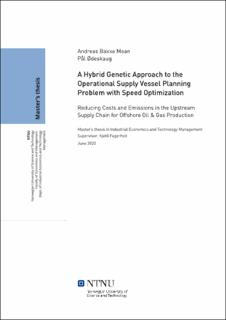| dc.contributor.advisor | Fagerholt, Kjetil | |
| dc.contributor.author | Moan, Andreas Bakke | |
| dc.contributor.author | Ødeskaug, Pål | |
| dc.date.accessioned | 2021-09-14T17:08:02Z | |
| dc.date.available | 2021-09-14T17:08:02Z | |
| dc.date.issued | 2020 | |
| dc.identifier | no.ntnu:inspera:55508684:57885808 | |
| dc.identifier.uri | https://hdl.handle.net/11250/2776968 | |
| dc.description.abstract | Denne oppgaven adresserer det operasjonelle aspektet ved planlegging og bruk av forsyningsfartøy
i Equinors offshore olje- og gasslogistikk. For at en offshore olje- og gassplattform
skal kunne operere kontinuerlig, trenger den forsyninger fra et forsyningslager på
land. Forsyningene fraktes fra lageret til plattformene med forsyningsfartøy, også kalt
platform supply vessel (PSV). På nåværende tidspunkt besitter Equinor beslutningsstøtteverktøy
som brukes i planleggingen av repetitive ukentlige planer. Disse overordnede,
repetitive ruteplanene må hver dag tilpasses operasjonelle faktorer som værforhold. Denne
daglige planleggingen gjøres i dag for hånd, noe som både er tungvint og ineffektivt.
Equinor har derfor uttrykt behov for et operasjonelt verktøy for beslutningsstøtte.
Masteroppgaven betrakter det Operasjonelle Planleggingsproblemet for Forsyningsfartøy
med Hastighetsoptimering (OSVPPSO). Problemet minimerer kostnader forbundet med
bruk av fartøy i den originale flåten og eventuelle leiekostnader av ekstra forsyningsfartøy.
Det presenteres en eksakt formulering av problemet, samt en metaheuristisk hybrid-genetisk
søkealgoritme med adaptiv mangfoldskontroll (HGSADC) for å raskt oppnå gode
og kostnadseffektive løsninger. For å introdusere det operasjonelle aspektet ved problemet,
tas reelt værvarsel i betraktning i planleggingen.
I motsetning til ukentlige planer der dårlig vær fører til forstyrrelser i ukeplanen og leveranser
som ikke kan utføres og må utsettes, gjør værbasert operasjonell planlegging det
mulig å tilrettelegge ruter og timeplaner til perioder der plattformer ikke kan motta forsyninger.
Hastighetsoptimering med hensyn til vær tilrettelegger for at rutene og timeplanene
blir tilpasset tidsvinduer hvor plattformene kan betjenes. I utgangspunktet ønsker man å
holde langsom og drivstoffseffektiv seilingshastighet, men dersom værforholdene forverres
med tiden kan PSVene øke seilingshastigheten og utføre leveranser før planen. På
denne måten kan man unngå forsinkede forsyninger og kostbare avbrudd i produksjon fra
utstyrsmangel. Med dette tatt i betraktning, vil løsninger på OSVPPSO gi værtilpassede
ruter og tidsplaner for PSVene som reiser fra forsyningslageret den neste avreisedagen.
Den eksakte løsningsmetoden klarer å finne optimale løsninger på små probleminstanser
innen en tidsramme på én time. Grunnet kompleksiteten av problemet, klarer den ikke
å løse større instanser til optimalitet. Den metaheuristiske HGSADCen klarer å finne
miljøvennlige og kostnadseffektive løsninger også på store instanser innen kort tid. Resultatene
fra beregningsstudiene viser at et beslutningsstøtteverktøy som løser OSVPPSO
kan være av stor verdi i operasjonell planlegging. | |
| dc.description.abstract | This master’s thesis addresses the operational aspect of supply vessel planning in offshore
oil and gas logistics faced by Equinor, the leading energy company in Norway. In order
to operate continuously, offshore installations regularly need supply deliveries from an
onshore supply depot. These supplies are transported to the installations with platform
supply vessels (PSVs). Currently, operations research-based support tools are used on
a tactical level, whereas the operational planning is still performed by hand after taking
external factors like weather forecasts into account. Obtaining cost-effective solutions by
hand is cumbersome for problems of this size and Equinor has expressed the need for an
operational decision-support tool.
This master’s thesis considers the Operational Supply Vessel Planning Problem with Speed
Optimization (OSVPPSO) which minimizes the costs related to the operations of PSVs
in the original fleet and chartering of external PSVs for support. An exact mathematical
formulation of the OSVPPSO along with a Hybrid Genetic Search with Adaptive Diversity
Control (HGSADC) for quickly obtaining high-quality solutions are presented.
To introduce the operational aspect of the problem, weather forecasts are taken into account.
For weekly plans where weather forecasts are not taken into account, poor weather
may lead to disruptions and missed deliveries. Including weather forecasts enable planning
of voyages and schedules accounting for weather-dependent operational restrictions
for PSVs and installations. Weather-dependent speed optimization allows voyages and
schedules to be tailored to the weather forecast for the upcoming days. If possible, fuel-efficient
sailing speeds are desired. However, if the weather becomes worse with time,
PSVs may increase their speed and perform deliveries in advance, and thus avoid postponed
deliveries and expensive halts in production. Accounting for this, a solution to the
OSVPPSO yields weather-adapted voyages and schedules for the PSVs departing the next
day, where speed optimization is applied for efficient use of PSVs.
Smaller-sized problem instances are solved to optimality with the exact solution method
within a time frame of one hour. Due to the complexity of the problem, medium and
large sized instances cannot be solved to optimality using a commercial solver within
reasonable time. However, the HGSADC provides environmentally friendly and cost-efficient
solutions within this time frame. Results from the computational study show that
a decision-support tool for the OSVPPSO can be valuable in supply vessel planning. | |
| dc.language | | |
| dc.publisher | NTNU | |
| dc.title | A Hybrid Genetic Approach to the Operational Supply Vessel Planning Problem with Speed Optimization | |
| dc.type | Master thesis | |
